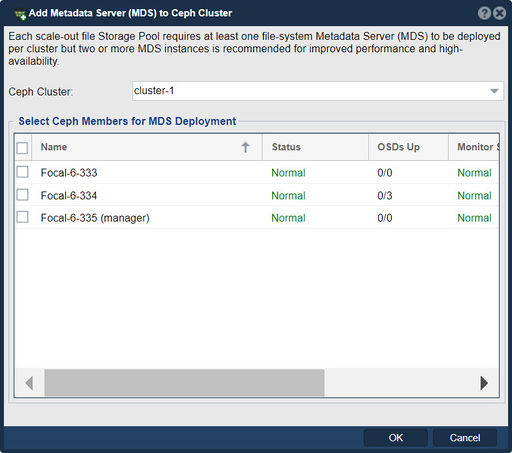Add Metadata Server To Ceph Cluster
In QuantaStor, the purpose of adding a Metadata Server (MDS) to a Ceph cluster is to enable the Ceph distributed File System (CephFS). Ceph is an open-source software-defined storage platform that provides scalable and distributed storage capabilities.
CephFS is a POSIX-compliant file system built on top of the Ceph object storage system. It allows you to create a shared file system that can be accessed by multiple clients concurrently. The Metadata Server is a critical component of CephFS that handles the metadata operations and manages the file system's namespace.
When you add a Metadata Server to a Ceph cluster in QuantaStor, you achieve the following objectives:
- Shared File System: By enabling CephFS, you can create a shared file system that can be accessed by multiple clients simultaneously. This is particularly useful in scenarios where multiple servers or virtual machines need to access and collaborate on the same set of files.
- POSIX Compliance: CephFS provides a POSIX-compliant interface, which means it supports standard file system operations and semantics. This allows you to leverage existing applications and tools that rely on POSIX file system interfaces without modifications.
- Scalability and High Availability: The addition of MDS servers to the Ceph cluster allows for scalability and high availability of the CephFS. MDS servers distribute the metadata management load across multiple instances, ensuring efficient performance as the number of files and clients increases. In case of MDS server failures, the remaining servers can take over the metadata management responsibilities, ensuring continuous access to the file system.
- Namespace Management: The MDS servers handle the file system's namespace, including file and directory metadata, permissions, and file attributes. By adding MDS servers, you improve the overall performance and responsiveness of namespace operations, such as file creation, deletion, and directory traversal.
- Fault Tolerance: QuantaStor's integration with Ceph allows for fault tolerance in the event of MDS server failures. The metadata is replicated across multiple MDS servers, ensuring data redundancy and avoiding a single point of failure. This redundancy enhances the availability and reliability of the CephFS.
- Quota and Security Features: With MDS servers, you can implement quota management and security features within the CephFS. Quotas allow you to set limits on the amount of storage that individual users or groups can consume. Additionally, you can control access permissions and implement authentication mechanisms to secure the CephFS.
In summary, adding a Metadata Server to a Ceph cluster in QuantaStor enables the use of CephFS, providing a scalable, shared, and POSIX-compliant file system. It improves performance, scalability, fault tolerance, and security while allowing for efficient namespace management and integration with existing applications.
Navigation: Scale-out Storage Configuration --> Scale-out Storage Clusters --> Service Management --> Add MDS (toolbar)
